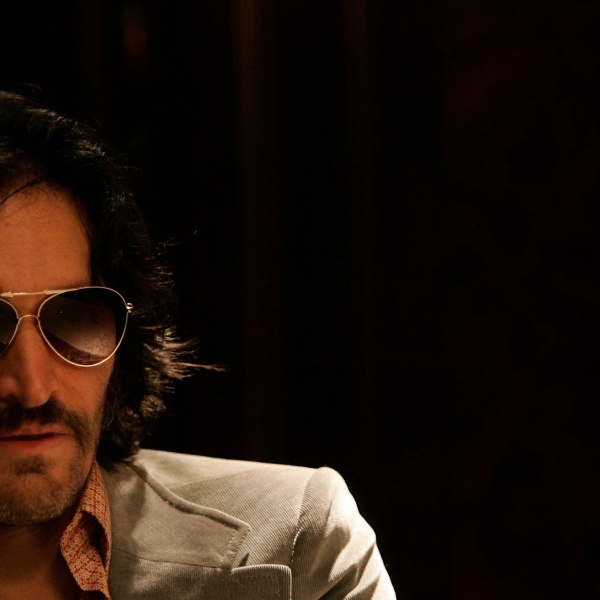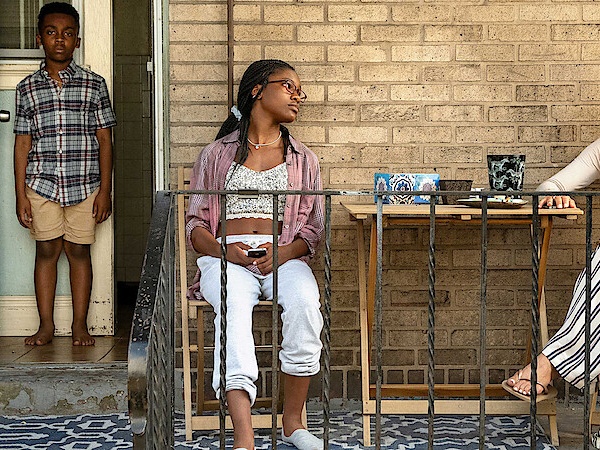
Let’s get this out of the way early; the cancer dramedy, “50/50,” formerly known as “I’m With Cancer,” is an admirable effort by all the parties involved. There’s maturity and restraint shown throughout in this story, about a healthy young twentysomething man staring his mortality in the face when he is suddenly diagnosed with a rare spinal cancer, and it’s a well-intentioned humanistic drama that tries to demonstrate that life is complicated and never quite cut and dry. The measured film takes pains to illustrate there is laughter to be derived in difficult and near-tragic situations and melancholy can also be found in some of the most humorous moments. It’s also a friendship movie that is wise enough to not feel like a bromance film. In fact, it feels like it comes from the playbook of master comedians like James L. Brooks, Judd Apatow and Albert Brooks who deftly understand that a little sour in sweetness and vice-versa can go a long, long way.
Produced by Seth Rogen and Evan Goldberg, (the writers behind “Superbad,” “Pineapple Express” and “The Green Hornet”), penned by their “Da Ali G Show” writer friend Will Reiser (who beat cancer himself) and directed by Jonathan Levine (“The Wackness“), there’s a palpable desire in the picture to… not leave man-child comedy behind per se… but to aspire to something a lot more grown-up.

And with that aim in mind, the creative quartet involved succeed, and arguably in spades, but in hopes of making a balanced and fully dimensional, living, breathing movie, the congenial and even-handed picture ends up not particularly funny or especially effective in its hoping-to-be-quietly-devastating moments. While Joseph Gordon-Levitt turns in an understated and capable performance, and Seth Rogen acts a comedic foil who delivers a few guffaws in his trademark chuckle, what “50/50” feels like it lacks throughout is true spark and inspiration. Few moments actually light up on screen or feel genuinely emotional. Instead, like the humming sound of fluorescent lights, what’s transmitted is a temperate feeling of mild laughs and moderate tears. It’s low-key to a fault.
Gordon-Levitt stars as Adam, the aforementioned physically-fit 27-year-old whose every day life as a radio producer in Seattle is thrown into disarray when he’s told those back pains he’s been feeling are a rare type of cancer in his spine. But he doesn’t smoke, he doesn’t drink and he even recycles. The unfairness of this diagnosis hits him like ton of quiet bricks, and the reserved man begins to veer into an almost inaudible denial. As the title suggests, his survival chances are split in the middle at best. Based on Reiser’s real-life experiences of being a young, healthy, white male unexpectedly hit with cancer, a lot of what Adam goes through and how he feels — the absurdity that this is actually happening to him — rings true. He tells his best friend Kyle (Rogen), who is amusingly both unhelpful in his holy-shit-this-is-terrible! reaction and useful in his encouraging, shit-we-can-beat-this-fucker! humorousness (hey, Lance Armstrong beat cancer several times, right?). 
Rogen cracks wise throughout, and while he doesn’t particularly stretch his acting or comedic abilities, he’s an important element in the story from preventing the tone from becoming too dour. But when Kyle tells his self-absorbed and superficial artist girlfriend (Bryce Dallas Howard) the bad news, the messiness of the situation, the ugly reality of it all, has the self-involved woman practically running for the door. Now while many late 20-something adultescents are often ill-equipped to handle such emotionally heavy news, Howard’s reaction is vile, heartless and punchable. If there’s anything resembling a villain in this picture it’s her glib and awful character, and it’s something of a one-note mis-step.
Meanwhile, Adam’s mother (Anjelica Huston) is devastated. Already grappling with a husband in the thick Alzheimer’s disease, her already overbearing nature tries to kick-in and nurture and take over her son’s life, but Adam repels from any of her shrill or emotional overtures. Starting to shut down and become numb to his situation, Adam takes a small comfort in going to therapy, only to be surprised to find Katie — a cute, but totally inexperienced therapist (Anna Kendrick) fresh out of school. Unskilled and not completely fit to be advising Adam, Katie nonetheless means well and tries to coax the internalizing patient out of his locked-down shell.
Adam also heads to chemotherapy treatment where he meets two older wiser patients (Philip Baker Hall and Matt Frewer) who employ dark humor and copious amounts of weed cookies as their coping mechanism. As the story progresses, Kyle and Adam do the best they can to remain up about the situation; Adam gets a dog (a strange looking greyhound called Skeletor that’s in the story for what seems like no particular reason) and they try and use his illness to their advantage with women, hoping that they’ll get lucky via pity. It amounts to some semi-humorous situations, but nothing feels entirely laugh out loud funny.
And perhaps it shouldn’t be considering what’s going on in the seriocomic picture, but the would-be touching moments aren’t particularly heartwrenching either, leaving the audience with an innocuous numbness all their own. While we see Adam’s loneliness and alienation from everyone around him, we never truly feel it. Part of it is a filmmaker, in Jonathan Levine, who (admirably) appears to be avoiding heavy-handedness and just trying to capture performances. Part of it is the low-key pervasiveness in the movie which makes it difficult to hit any moving emotional targets. Tone isn’t so much a problem as it is a detriment — much of the space and time is given to the carefully divided ratio between heartfelt scenes and comedy used to deflect the gravity of the story, so much so that the tone ultimately ends up being neither here nor there.
A world class composer for the likes of action-adventure films by the likes of J.J. Abrams, here in this dramedy, Michael Giacchino‘s score is fairly harmless and genial, but largely unremarkable. One of the truly off notes of the picture is the soundtrack. While never utilized too often, still the dreaded music-video montage sequences — a short cut to inform the audience of how they should feel in lieu of what’s onscreen — pops up twice in the on-the-nose use of songs by Radiohead and The Liars.
There’s been a lot of Oscar talk from early audience screenings and things of that nature, and while that’s flattering and all, this writer can’t see this film penetrating the Academy doors at all. That’s not to say there aren’t good performances in the picture. If anyone here would be earning any accolades it’s Joseph Gordon-Levitt, but his likable and well-proportioned turn in this picture isn’t the type that earns nominations. “50/50” is a picture you want to root for — it’s mellow, it’s adult and it’s generally approached with a directorial calm and collected head, but it’s also a bit bottled up and fails to truly connect emotionally. [C+]




